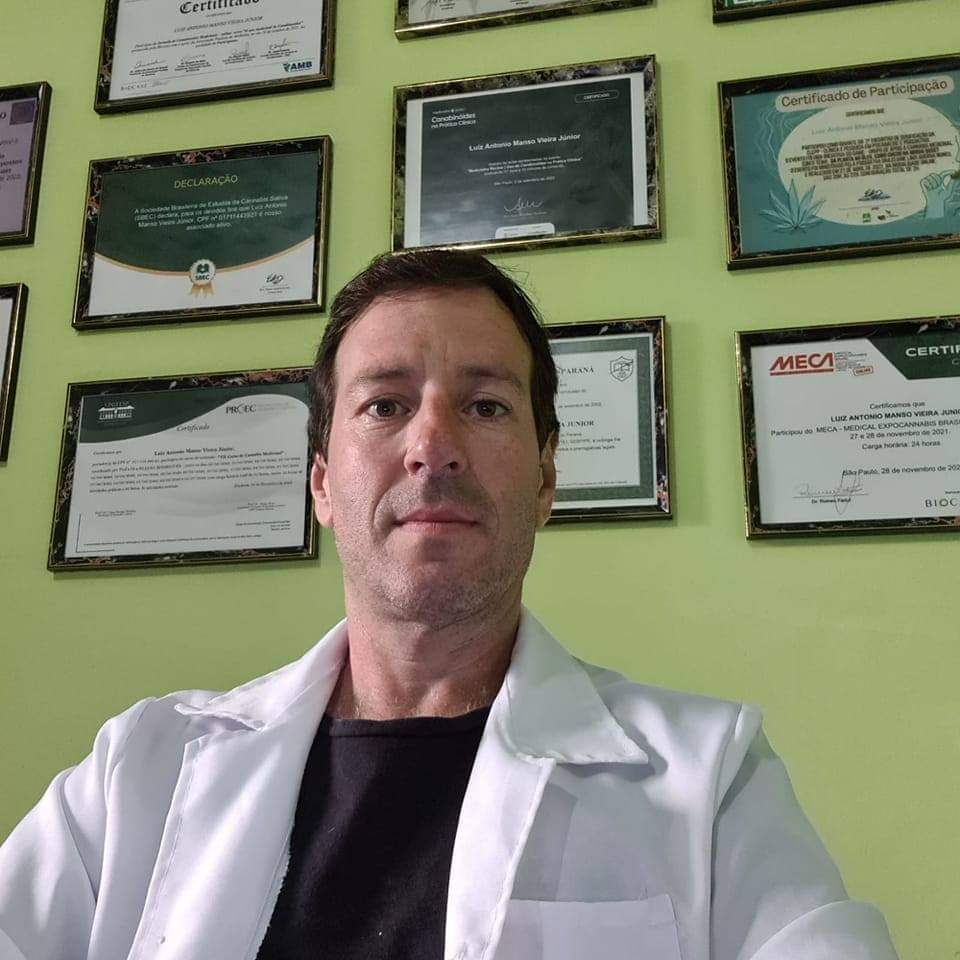Professor Advocates for Inclusion of Physical Therapists in Cannabis-Based Treatment
COFFITO Ruling No. 735/2024 authorizes physical therapists with specific training to prescribe medications and supplies; however, Anvisa recognizes only doctors and dentists as prescribers of cannabis for medicinal purposes
Published on 07/25/2025

More health more access more life with medicinal cannabis | CanvaPro
When a physical therapist says that the body is nature and that to heal it, one must reconnect with it, they are not just being poetic. They are being profound, technical, and, above all, human.
In Balneário Piçarras, Santa Catarina, physical therapist Luiz Antonio Manso Vieira Júnior transforms clinical practice into a reconnection with oneself, with life, and with science. And at the center of this reunion is cannabis.
A Perspective that Cares for Function and Life

Luiz works with what he calls endocannabinoid tone modulation, an approach that integrates medicinal cannabis, traditional phytotherapy, supplementation, stress control, and therapeutic exercise. His practice, guided by over 2,500 hours of training, goes beyond pain: it touches on sleep, anxiety, stiffness, cognition, and what traditional medicine often forgets to consider: quality of life.
“Treating the Endocannabinoid System is treating function. And the physical therapist is, by excellence, the specialist in function”, states Luiz, who is also a professor in postgraduate courses on cannabis prescription.
The connection with the plant, according to him, happens with the same naturalness as the endocannabinoids that our own body produces. A relationship of molecular familiarity and, perhaps, also spiritual.
With solid specialization in Medicinal Cannabis and Cannabis Sativa, Luiz prescribes medicinal cannabis supported by COFFITO Ruling No. 735/2024. This ruling, published on September 10, 2024, recognizes that the physical therapist has full competence to prescribe, administer, and acquire medications and supplies, including those with different routes, injectable, pressurized, topical, or oral, as long as it is within their area of training and under their clinical responsibility.
It is important to note that although medicinal cannabis is still classified as a plant-derived product and not a medication, the ruling makes no distinction: both are authorized, provided they are prescribed by a qualified professional.
This legal security is reinforced by other regulatory frameworks, such as Resolution No. 380/2010, which recognizes phytotherapy in physiotherapy, and RDC No. 940/2024 by Anvisa, which formally included Cannabis sativa L. in the Brazilian Pharmacopoeia, strengthening the scientific and legal support of the integrative care conducted by Luiz.
It is important to highlight that Anvisa allows only doctors and dentists to prescribe cannabis-based products for human use, as established by RDC No. 327/2019, which regulates the commercialization of plant-derived products in pharmacies with a medical prescription. Meanwhile, RDC No. 660/2022 outlines the procedures for the individual importation of these products by patients with a prescription.
In the case of veterinary use, the prescription is exclusively authorized for veterinarians, based on Ordinance SVS/MS No. 344/1998, provided it is done with a special prescription and the products are duly regulated for animal use.
In Clinical Practice, Lives That Return to Living
Luiz recounts with a sparkle in his eyes (even if through letters and stories), he has seen patients with fibromyalgia, anxiety, and insomnia return to sleep, work, and dream. A cycle of suffering that breaks when cannabis enters as functional support: pain reduces, mood stabilizes, life finds space to flourish.
"I have had patients with more than 90% reduction in pain", he recalls and warns: “there is no standard dose. The Endocannabinoid System is like a fingerprint, unique in each organism. Therefore, monitoring needs to be close, ethical, and documented. ICD, therapeutic plan, consent form: every detail matters.”
Challenges That Still Breathe Prejudice and Misinformation
Despite all the technical support, Luiz still faces one of the biggest obstacles: prejudice. “Many still confuse therapeutic use with adult use. For me, all use is therapeutic in some way,” he states.
The key, according to him, is preparation: continuous training, deep mastery over drug interactions, and, above all, empathy to listen and guide. Physical therapists, like doctors, dentists, or nutritionists, have a vital role in this journey. And the more well-prepared professionals, the more paths open for more people to have access to cannabis and, with it, to comprehensive health.
A Future with More Green and More Life
More trained physical therapists, more people cared for with dignity. More science alongside ethics. More quality of life as a possible horizon. This is what Luiz Manso practices, teaches, and plants every day, with his feet on the ground and his eyes on the green of hope. “Our body is nature,” reinforces Luiz. And perhaps the medicine of the future, which is actually already present, is the one that finds in nature the beginning of all cures.
Read Also
Medicinal Cannabis Emerges as an Ally in Bursitis Treatment
Can Physical Therapists Prescribe Cannabis? Understand the Legislation and the Profession's Limits









